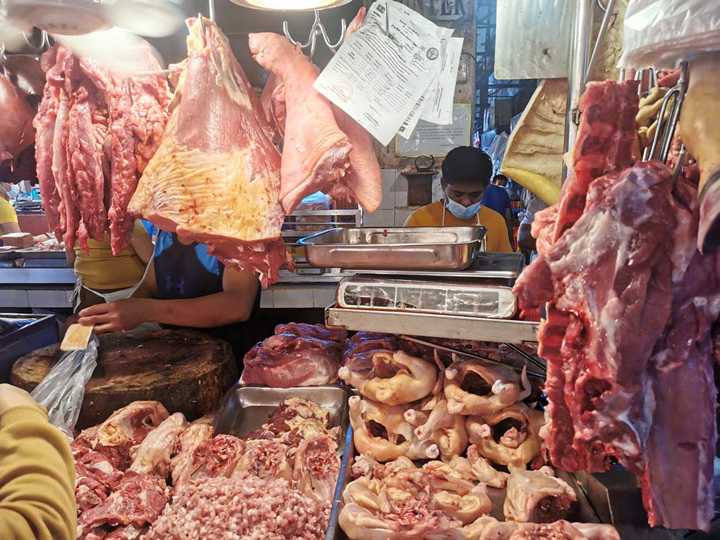
THE government has lifted the restriction on the sale of pork imports under its minimum access volume plus (MAV+) program, allowing importers and traders to sell their stocks to areas outside the NCR plus, which have “relatively high prices” of pork meat.
Agriculture Secretary William D. Dar issued Memorandum Circular (MC) 23, which amended the guidelines of its pork MAV+, in order to “facilitate the full utilization” of the expanded import program following delays in arrival of the country’s much-needed pork supply.
Under the MC, the DA has expanded the market coverage for imports under the pork MAV+ beyond the NCR plus areas (Metro Manila, Bulacan, Rizal, Laguna and Cavite).
The initial guidelines of the pork MAV+ only limited the sale of pork imports to wet markets, supermarkets and Kadiwa stores in the NCR plus area.
Furthermore, the MC allowed the selling of pork MAV+ to meat processors and institutional buyers. Certain quarters of the industry have been clamoring to allow the sale and use of pork imports under the MAV+ program by meat processors.
The agriculture chief explained that he amended the guidelines to facilitate the “full utilization” of the pork MAV+ following the “very low” utilization of the pork MAV+ “due to the very strict market restrictions and distribution,” which defeated the objectives of the import program.
The agriculture chief also noted that the global logistics and shipping problems have “affected” the arrival of the 70 percent or 140,000 MT of pork imports under the MAV+ for the July to October schedule. Dar disclosed that shipment transit time is now averaging 120 days from the usual 30 to 40 days.
“Hence, the arrival of the remaining 30 percent or 60,000 MT in January 2022 or the end of MAV year 2021 has to be fast-tracked,” Dar said.
The MC noted that the goals of the government’s pork MAV+ program, laid down by President Duterte’s Executive Order 134, is to boost domestic pork supply and provide consumers with adequate and affordable meat.
“Only four regions registered a single-digit inflation instead of a less than double-digit inflation rate on meat while the rest displayed higher than the national rate of 4.2 from January to August 2021,” the document read.
“There is a considerable deficit in pork supply being experienced all over the country,” it added.
The Cold Chain Association of the Philippines (CCAP) welcomed the lifting of the sale restriction, noting that it would create a “positive ripple effect” in the domestic market as supply of cheaper imported pork would reach areas beyond NCR+.
Furthermore, CCAP President Anthony S. Dizon told the BusinessMirror the government’s latest action would decongest the volume of frozen imported pork in cold storages.
The CCAP earlier urged the government to lift the restriction on sale of pork imports under the MAV+ program to decongest cold storages and allow other regions to enjoy cheaper pork products. (Related story: https://businessmirror.com.ph/2021/10/18/imports-beef-up-pork-inventory-in-oct-nmis/)
Market reaction outside the NCR+ is hard to predict, “but I would imagine it would create a positive ripple effect on the market because the imported products would reach areas outside the usual coverage. The market coverage would expand and logically, the depletion rate of the volume in cold storages should increase,” Dizon said.
Dizon also noted that transportation of imported frozen pork stocks from one region to another may face procedural concerns, arisin from compliance with government rules.
“It will depend on the procedural limitations that the NMIS (National Meat Inspection Service) will impose,” he said.
“There are only cold storage facilities authorized to transfer from point A to point B. So, that will now depend on whether cold storage facilities that are now holding the imported pork are all authorized to transport from wherever they are now to wherever they want to go,” he added.
The country’s frozen pork inventory as of October 11 reached 73,294.01 MT, with the bulk being imported supply — or about 71,527.73 MT, based on latest National Meat Inspection Service (NMIS) data.
NMIS data also showed nearly 60,000 MT of the total imported frozen pork inventory were stored in cold storages located in NCR, Regions III and IV-A.

